- Home
- Linda Lael Miller
My Darling Melissa Page 2
My Darling Melissa Read online
Page 2
Giving a long, low whistle of exclamation through her front teeth, Melissa set aside her heartbreak over Ajax and began straining to unfasten the many buttons at the back of her gown. Only that morning Mama and Banner and Fancy and Tess had been there, doing them up by turns and joking that it was too big a job for one woman but perfect for one man.
Tears sprouted in Melissa’s eyes, but she forced a smile into her voice. “You live a shamefully self-indulgent life, Mr. Rafferty,” she called out.
Rafferty ignored the observation. “Tell me what that bastard did to you, to make you run away and then cry like that.”
Grateful for the wall that hid her from his view, Melissa squirmed and struggled with those dratted buttons for several frustrating moments, then answered, “You won’t believe it, Mr. Rafferty. You truly won’t believe it.”
“Try me,” prompted Mr. Rafferty.
It would be a relief to confide in someone, Melissa decided. Someone objective, someone unimportant in the general scheme of her life. “He had a mistress,” she confessed in a very small voice, as though the sin of that were somehow her own. “He’d brought her all the way from Munich and installed her in a house in Port Hastings and then had the gall to invite her to our wedding!”
There was silence from beyond the partition, the still kind that precedes a violent storm. But instead of exploding, Mr. Rafferty came around and began helping Melissa with the buttons of her gown.
The motions of his fingers were awkward and slow, but there was something so tender in the gesture that Melissa felt fresh tears smarting in her eyes. Lord knew she’d done her share of crying that day, and then some. It was time to stop, to get a hold of herself, to go on with her life.
She lifted her chin and sucked in her breath.
“Where exactly is this train headed?” she asked.
“I wondered if you were ever going to get around to asking about that. It’s on its way to Spokane.”
Melissa’s mouth fell open, and she whirled, clutching the bodice of her dress to her bosom with both hands so that she wouldn’t further disgrace herself. “Spokane! That’s on the other side of the state!”
The look in Quinn Rafferty’s brown eyes was completely at variance with the gentle solicitation he’d shown moments before. It was, in point of fact, arrogant and quite smug. “What do you care—Miss Pullman?” he drawled.
Melissa’s cheeks smarted with heat and color. She could not afford to offend this man. She was alone with him in a railroad car that looked as if it had been decorated by a spendthrift madam. It was night, and they were in the middle of nowhere.
“My name isn’t Miss Pullman,” she confessed, lowering her eyes.
“No!” he cried in mock surprise, laying one hand to his breast.
Melissa stamped one foot. “I’m Melissa Kate Corbin,” she announced, infuriated. “Do you know what that means, Mr. Rafferty?”
The expression of surprise was transformed into one of theatrical horror. “No. What, pray tell, does that mean?”
Melissa was stumped. Under the circumstances, she wasn’t sure it meant anything.
“Never mind,” she finally said.
Rafferty chuckled at that, finished unfastening her dress, and then left her to her privacy.
“You’re better off without this Ajax character,” he observed after some time, when the lamp had gone out. By then Melissa was cuddled deep between the silken sheets of Mr. Rafferty’s bed, clad only in his ruffle-fronted shirt. He was probably sleeping on the narrow bench where she had reclined before.
Melissa sighed. “I suppose so.”
“I still don’t understand why you had to run away. You could have explained the whole thing to your family—”
“But I couldn’t have,” Melissa argued. “Mama and I had had words about Ajax on more than one occasion—she never liked him, you know. And if I’d told my brothers—well, Keith would probably have been civil enough—he’s a preacher, after all—but Adam and Jeff? It doesn’t bear considering. Heaven only knows what they might have done to Ajax.”
Mr. Rafferty let out a long sigh, as if to show an infinite capacity for suffering. “So you decided to jump aboard the first train out of town,” he said.
“Of course not. I was just running, that’s all. And I ended up in the railroad yard, so—”
A richly masculine chuckle sounded in the darkness.
“Do you live in Port Hastings?” Melissa asked, wanting to change the subject. “I don’t remember ever seeing you there before.”
“I make my home on the other side of the peninsula, Miss Corbin. In Port Riley.”
Melissa settled deeper into the silken sheets. There was a certain rivalry between the two towns, and that added a spark to an already provocative situation. She sighed. “My brothers say that Port Riley will be a ghost town in five years.”
“Oh, they do, do they?”
“Yes. To use Jeff’s own words, there’s one piss-ant sawmill grinding out two-by-fours, and that’s it for industry.”
“ ‘One piss-ant sawmill’?” It was obvious that Melissa had touched a nerve. “I’ll have you know that ’piss-ant sawmill’ is mine, Miss Corbin, and I own one of the biggest timber operations in this state. There are four banks in Port Riley, along with a cannery and a library and a hospital. Until six months ago, there was a newspaper.” He paused and drew a deep breath before finishing grandly, “Furthermore, there are seventeen saloons.”
“Oh,” Melissa chimed, with prim airiness. “That changes everything. Any community with seventeen saloons is certainly worthy of its position on the map.”
“Go to sleep, Miss Corbin. Tomorrow will be a long day.”
Melissa didn’t want to think about the next day—or all the tomorrows that would follow it. And she wasn’t ready to go to sleep.
“What happened to the newspaper?”
Rafferty gave an exasperated sigh. “What newspaper?”
“The one Port Riley had until six months ago.”
“It was burned out.”
“By accident?”
“On purpose. Somebody had a difference of political opinion with the publishers.”
“Who?”
“I have no idea, Miss Corbin.”
“Well, that’s a fine thing. Don’t you have a United States marshal in your town?”
“Yes, we have a United States marshal in our town,” Mr. Rafferty mimicked. “I think he has his suspicions, but he never came up with any proof. Now, if you’ll just shut your lovely little mouth, Miss Corbin …”
“I need to talk.”
Rafferty sighed again. “I think Sir Ajax Whoever may have missed out on a fate he richly deserved.”
“What is that supposed to mean?”
“Nothing. Nothing at all. Forgive me,” Mr. Rafferty said wryly. “I lost my head for a moment.”
“Why are you going to Spokane?”
Mr. Rafferty groaned. “I have business there.”
“What kind of business?”
There was a short, deadly silence, but the answer, when it came, was quite reasonably stated. “I mean to deposit you in a hotel, then contact your family and let them know that you’re all right. After that I will meet with some business partners of mine—”
“I am not going to be ‘deposited’ in some hotel like a runaway child,” Melissa, sitting bolt upright in bed, informed him. In that moment she knew that she could never go home—her pride wouldn’t let her—until she’d accomplished something real and lasting all on her own. Otherwise the family would fuss over her ever after, as if she were an eccentric spinster.
The prospect was alarming; the reality would be unbearable.
She got to her knees and moved aside the window blind to peer out at the passing countryside. The moon bathed the barren country of central Washington State in an eerie light. “I can look after myself,” she said, hiding all her uncertainties in a bright tone of voice.
And then she lay down again, closed he
r eyes, and slipped into a fitful sleep.
When Melissa awakened the car was filled with sunlight, and an elephant seemed to be balancing on one foot on her chest. Her nose was clogged, and the heat emanating from her body was so intense that it threatened to smother her.
A stranger with a bristly white mustache and a stethoscope affixed to his bald head was bending over the bed. “You’ll be just fine, miss,” he told her.
Melissa was certain that she was dying of some mysterious plague the likes of which had never been documented before. She started to croak out her last words and found they wouldn’t come.
“Lots of lemon juice, that’s what she needs,” the doctor said jovially. And then he turned away.
Accommodatingly, Quinn soon brought her a steaming mug. He looked damnably handsome and damnably healthy in his clean, well-tailored clothes. Melissa could see the ridges left by a comb in his still-damp hair.
Despite her proximity to the hereafter, she managed to drag herself to a sitting position and reach out for the mug. The lemon juice had been liberally laced with liquor.
“Sorry about your new start in life and all that,” Quinn said merrily. “Guess you’ll just have to go on with the old one.”
Melissa narrowed her eyes at him. The moment she arrived on the other side she’d get permission to become a ghost. And then she meant to haunt Mr. Rafferty until all his hair either turned white or fell out.
Rafferty laughed as though he could read her impotent thoughts and patted her fever-hot cheek. “If you’re very good, I’ll bring you a present,” he condescended to say. “Mind Eloise now, and rest yourself.”
Eloise, a dour woman in black sateen, appeared at the end of the bed. She was holding a Bible to her bosom and peering through the tiny square lenses of her glasses. It was clear that she had the wrong idea entirely about who Melissa was and what she was doing in Mr. Rafferty’s railroad car, sick unto dying or not.
Melissa closed her eyes. They must be in Spokane, she realized, too ill to care what it was she’d meant to do there.
The day was a difficult one. Melissa slept deeply at intervals, but then the fever and her fiery throat would awaken her, making her toss and turn in abject misery.
She was delighted when Mr. Rafferty arrived at nightfall. He brought a present, just as he’d promised, and sent Eloise away.
With the last shreds of her failing strength—she was sure to be dead by morning—Melissa clawed the wrapping paper from the gift Quinn had laid in her lap. It was a book, and Melissa would have laughed if she’d been able to, because she’d written the opus herself—under a pseudonym, of course.
Her eyes sparkled with more than fever as she looked questioningly at her benefactor.
“They’re bringing beef stew from the dining car,” he said, undoing his tie beside the bed. His glance fell again to the book. “Pure trash, according to the bookseller,” he said, “but women love it.”
He looked completely baffled when Melissa hurled the volume at his head.
Two
Quinn dragged a chair to Melissa’s bedside, determined to lend comfort whether it was wanted or not, and sat down to read from the book she had just thrown at him. Wearing the same serious expression she’d seen on her brother Adam’s face when he was perusing a medical journal, Mr. Rafferty turned to the first page of chapter one and read soberly, “ ‘Phoebe Millikin was a woman bound for destruction.’” He stopped and gave the book’s cover a pensive look, then cleared his throat and went on.
Melissa settled into her pillows, all ears. Despite the fact that she’d written Phoebe’s Dangerous Decision herself, she was intrigued. The carefully chosen words sounded different falling from Mr. Rafferty’s lips. More august, somehow.
He’d covered only about two pages when there was a respectful rap at the railroad car’s inner door. Quinn got up to answer it, leaving the book in the seat of his chair.
The beef stew had arrived. Quinn allowed Melissa the use of the tray while he sat on the edge of the bed, holding his bowl in one hand and his spoon in the other.
“Mind your manners,” he warned, waggling the spoon at Melissa. “I can overlook having a book thrown at me, but stew is another matter.”
In spite of herself and all her miseries, Melissa smiled. She tasted the stew and found it as savory as any Maggie McQuire might have concocted for the family back home.
Quinn was frowning at her; he had yet to take a bite of his own food. “We have a problem here,” he said, as though that were some great revelation.
“We have a number of problems,” Melissa pointed out in a scratchy voice that hurt her throat.
Rafferty took in the wrinkled linen shirt she had been wearing since taking off her wedding dress. “You haven’t got a damned thing to wear,” he said. “This is a scandalous situation—the kind of fine how-do-you-do that could ruin a lady’s reputation.”
“What about your reputation, Mr. Rafferty?” It pained Melissa to ask.
He grinned, showing those flawless white teeth of his. “It can only be enhanced,” he said.
Melissa considered crowning him with her bowl of stew but in the end refrained. She was ravenously hungry—it appeared that death was not imminent after all—and wanted every morsel of her food. She said nothing.
Quinn’s glance strayed to the book sitting in the seat of the chair he’d occupied a few minutes before. “I’m sorry you didn’t like your present,” he told Melissa.
Melissa chewed thoughtfully and swallowed with great care for her sore throat before replying, “It wasn’t the present itself, Mr. Rafferty. It was what you said about it.”
He looked genuinely baffled. “What was that?” he asked.
“You called my book ‘trash,’” Melissa answered reasonably. “I worked long and hard on the manuscript, and while Phoebe is admittedly no Emma Bovary or Jane Eyre, she does represent my best effort.”
Quinn’s mouth sagged open; Melissa resisted an urge to thrust a spoonful of stew into it. Again, it was greed that stopped her.
“You wrote that book?” Rafferty finally managed to ask.
Melissa finished her stew and fell back against her pillows, weary from the effort of eating. “I did indeed. That one and three others, if you count the dime novels I wrote as Marshal S. Whidbine.”
“I’ll be damned,” Quinn muttered.
“Probably,” sighed Melissa, “but that’s no concern of mine.” She yawned widely, closed her eyes, and tipped her chin at an imperious angle. “Read on,” she ordered.
“I will not,” Quinn said flatly.
She heard dishes clatter together on the tray and felt it lifted from her lap but did not open her eyes. After a while she slept.
The renewed motion of the train awakened her; she sat up in bed. They must have begun the journey back west. The car was dark, except for a splash of golden light fringing the partition. “Quinn?” she called in a small voice.
When he didn’t answer she scrambled shakily out of bed and peered around the wall.
Quinn was seated at a desk, Melissa’s novel open before him. He looked up at her and shook his head in dour amazement.
Melissa felt a blush climb her face. Though she couldn’t think why, she wanted Quinn to like her work, even to admire it. Obviously, it was more of a curiosity to him.
“You might have mentioned that we were leaving Spokane,” she said as the floor shook under her feet. “It just so happens that I wanted to stay there.”
Quinn shrugged. There was a parcel on the corner of his desk, and he tossed it somewhat cavalierly to Melissa. “Here. Compliments of your devoted nurse.”
Melissa caught the flying bundle in both arms; it was quite heavy. “What is it?”
One of Quinn’s powerful shoulders moved in a shrug. “Some evidence of her Christian charity, I would imagine. She and the doctor were very concerned for your soul.”
Melissa had already learned that Eloise was the sister of the doctor Quinn had summoned to the
railroad car that morning. She was almost afraid to look inside the parcel. “I suppose I should go back to bed,” she remarked lightly, feeling lonesome.
“I suppose you should,” Quinn answered, closing the book with a telling slam and standing up. “I think I’ll go to the club car myself. Play a hand or two of poker.”
Melissa’s knees were a bit shaky, and she made her reluctant way back to bed. “I know how to play poker,” she volunteered hopefully. It was going to be downright dismal in that car if Mr. Rafferty went away and left her.
She heard a drawer open and close, and then Quinn was standing in view of the bed, his hand on the door that led to the next car.
“Get some sleep,” he said, giving her an indulgent grin, and then he was gone.
Melissa’s eyes burned with tears; she dried them with her palms and valiantly refused to shed more. The devil with Mr. Rafferty, if he didn’t want to play a hand of poker with her. He was probably an easy mark anyway.
After a few moments of true despair Melissa forced her attention to the package Eloise had sent. It was wrapped in brown paper and bound tightly with twine, and it took a good deal of concentrated effort to open it.
Inside were two dull, prim calico dresses, along with two pairs of muslin drawers, two camisoles, one oft-mended petticoat, and a dark woolen shawl. There was also a pair of black high button shoes that looked a shade too big for Melissa’s feet.
She sat stunned, teetering between fits of laughter and wails of outrage. She was a member of one of the richest, most powerful families in the state and had never expected to be the recipient of Christian charity.
Melissa bit down on her lower lip and held herself steady. The plain truth was that, even though she had access to a fortune, even though there wasn’t a gown in all the world so expensive that she couldn’t afford to buy it, she needed these clothes. The only other garment she had on hand was a mud-stained wedding dress with a tear in the hem.
She blinked back more tears, sniffled, and then uttered a forlorn little chuckle. A person couldn’t start a new and independent life in a dirty wedding gown.

 Angelfire
Angelfire Moonfire
Moonfire The Yankee Widow
The Yankee Widow The Cowboy Way
The Cowboy Way Country Strong--A Novel
Country Strong--A Novel Forever and a Day
Forever and a Day The Black Rose Chronicles
The Black Rose Chronicles Montana Creeds: Logan
Montana Creeds: Logan My Darling Melissa
My Darling Melissa Skye
Skye McKettricks of Texas: Tate
McKettricks of Texas: Tate Springwater Seasons
Springwater Seasons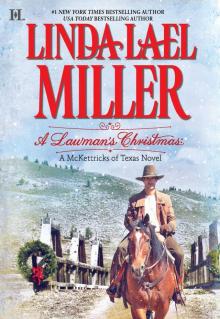 A Lawman's Christmas
A Lawman's Christmas Sierra's Homecoming
Sierra's Homecoming![Parable, Montana [4] Big Sky Summer Read online](http://i1.bookreadfree.com/i/03/22/parable_montana_4_big_sky_summer_preview.jpg) Parable, Montana [4] Big Sky Summer
Parable, Montana [4] Big Sky Summer One Last Weekend
One Last Weekend A Stone Creek Collection, Volume 2
A Stone Creek Collection, Volume 2 Tonight and Always
Tonight and Always Fletcher's Woman
Fletcher's Woman A Snow Country Christmas
A Snow Country Christmas The Last Chance Cafe
The Last Chance Cafe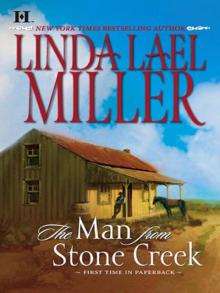 The Man from Stone Creek
The Man from Stone Creek Wanton Angel
Wanton Angel McKettricks of Texas: Garrett
McKettricks of Texas: Garrett Memory's Embrace
Memory's Embrace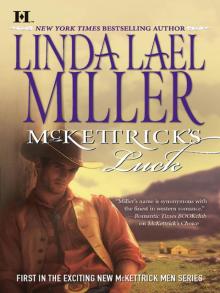 McKettrick's Luck
McKettrick's Luck Pirates
Pirates Big Sky River
Big Sky River Willow: A Novel (No Series)
Willow: A Novel (No Series) The McKettrick Legend: Sierra's HomecomingThe McKettrick Way (Hqn)
The McKettrick Legend: Sierra's HomecomingThe McKettrick Way (Hqn) Glory, Glory: Snowbound with the Bodyguard
Glory, Glory: Snowbound with the Bodyguard Two Brothers
Two Brothers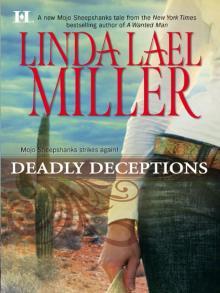 Deadly Deceptions
Deadly Deceptions Big Sky Secrets
Big Sky Secrets Garrett
Garrett A Creed in Stone Creek
A Creed in Stone Creek Megan
Megan McKettricks of Texas: Austin
McKettricks of Texas: Austin Knights
Knights High Country Bride
High Country Bride More Than Words Volume 4
More Than Words Volume 4 Glory, Glory
Glory, Glory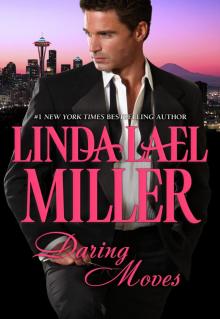 Daring Moves
Daring Moves Lily and the Major
Lily and the Major Courting Susannah
Courting Susannah Banner O'Brien
Banner O'Brien Big Sky Mountain
Big Sky Mountain Linda Lael Miller Bundle
Linda Lael Miller Bundle McKettrick's Pride
McKettrick's Pride A Stone Creek Collection Volume 1
A Stone Creek Collection Volume 1 A Wanted Man
A Wanted Man Big Sky Country
Big Sky Country The McKettrick Legend
The McKettrick Legend Christy
Christy McKettrick's Heart
McKettrick's Heart Resurrection
Resurrection Arizona Heat
Arizona Heat Secondhand Bride
Secondhand Bride Snowflakes on the Sea
Snowflakes on the Sea Montana Creeds: Tyler
Montana Creeds: Tyler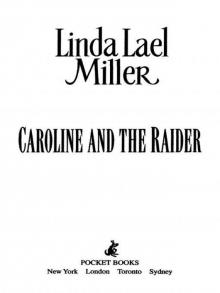 CAROLINE AND THE RAIDER
CAROLINE AND THE RAIDER A Proposal for Christmas: State SecretsThe Five Days of Christmas
A Proposal for Christmas: State SecretsThe Five Days of Christmas Yankee Wife
Yankee Wife Linda Lael Miller Montana Creeds Series Volume 1: Montana Creeds: LoganMontana Creeds: DylanMontana Creeds: Tyler
Linda Lael Miller Montana Creeds Series Volume 1: Montana Creeds: LoganMontana Creeds: DylanMontana Creeds: Tyler The Christmas Brides
The Christmas Brides McKettricks Bundle
McKettricks Bundle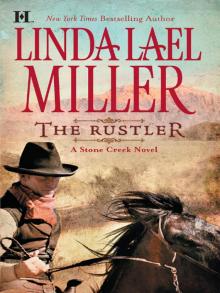 The Rustler
The Rustler Here and Then
Here and Then Only Forever
Only Forever Once a Rancher
Once a Rancher The 24 Days of Christmas
The 24 Days of Christmas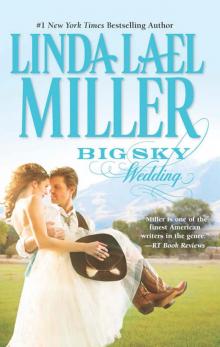 Big Sky Wedding
Big Sky Wedding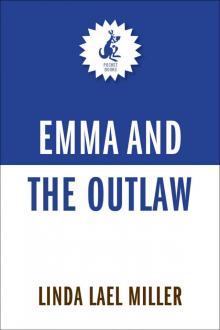 Emma and the Outlaw
Emma and the Outlaw Princess Annie
Princess Annie Wild About Harry
Wild About Harry That Other Katherine
That Other Katherine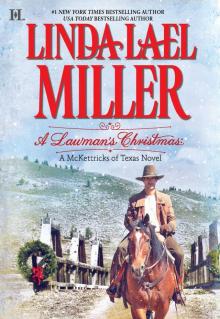 A Lawman's Christmas: A McKettricks of Texas Novel
A Lawman's Christmas: A McKettricks of Texas Novel Just Kate: His Only Wife (Bestselling Author Collection)
Just Kate: His Only Wife (Bestselling Author Collection)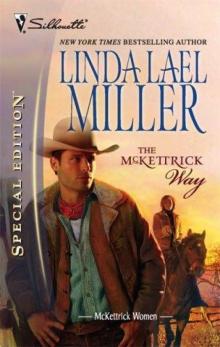 The McKettrick Way
The McKettrick Way Part of the Bargain
Part of the Bargain Taming Charlotte
Taming Charlotte Holiday in Stone Creek
Holiday in Stone Creek One Last Look
One Last Look Always a Cowboy
Always a Cowboy Batteries Not Required
Batteries Not Required A McKettrick Christmas
A McKettrick Christmas For All Eternity
For All Eternity The Marriage Season
The Marriage Season Corbin's Fancy
Corbin's Fancy The Creed Legacy
The Creed Legacy Springwater Wedding
Springwater Wedding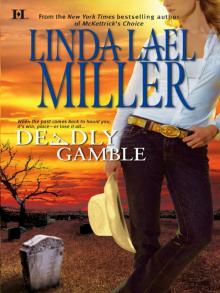 Deadly Gamble
Deadly Gamble Austin
Austin Creed's Honor
Creed's Honor A Creed Country Christmas
A Creed Country Christmas Escape from Cabriz
Escape from Cabriz There and Now
There and Now The Bridegroom
The Bridegroom State Secrets
State Secrets Bridget
Bridget